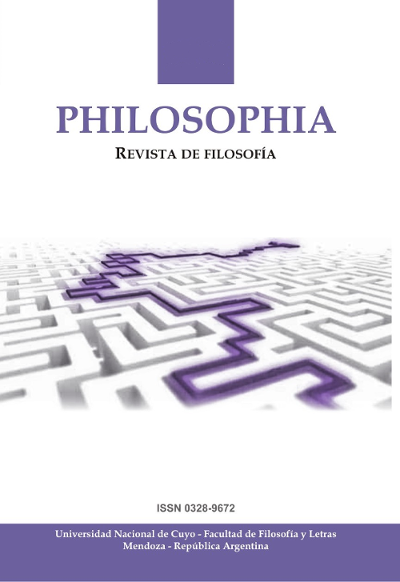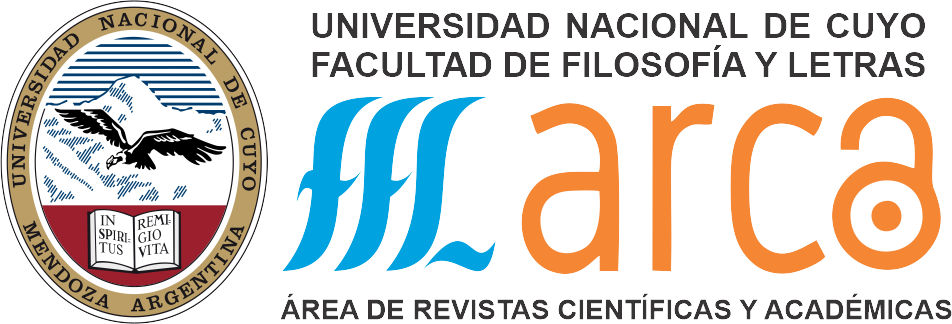The Philosophical use of the Lógos Protreptikós in the Aristotle’s Ethical Writings
DOI:
https://doi.org/10.48162/rev.50.009Keywords:
Protreptic, Aristotle, Rhetoric, DialecticsAbstract
The protreptic was a type of exhortative speech used in antiquity with different purposes: to promote a philosophical ideology, to urge to act in a certain way, to persuade about the importance of incorporating certain habits. For this reason, it was implemented, in different areas, by various disciplines, including philosophy.
Although the catalogs of his work show that Aristotle only wrote a protreptic, the analysis of his esoteric texts allows us to say that in his lessons he would have implemented resources characteristic of this type of discourse. The aim of this paper is to examine how Aristotle appropriates and uses the lógos protreptikós in his philosophical activity.
References
Aristotele. Dialoghi. Introduzione, traduzione e commento di Zanatta, Marcello. Milano: BUR, 2008.
Aristóteles. Ética Nicomáquea - Ética Eudemia. Introducción, traducción y notas de Pallí Bonet, Julio. Madrid: Gredos, 1988.
Aristóteles. Física. Introducción, traducción y notas de Echandía Guillermo. Madrid: Gredos, 2007.
Aristóteles. Fragmentos. Introducción, traducción y notas de Vallejo Campos, Álvaro. Madrid: Gredos, 2005.
Aristóteles. Metafísica. Introducción, traducción y notas de Calvo Martínez, Tomas. Madrid: Gredos, 2007.
Aristóteles. Protréptico. Introducción, traducción y notas de Megino Rodríguez, Carlos. Madrid: Abada, 2006.
Aristoteles. Protreptico. Introduzione, traduzione e commento di Berti, Enrico. Milano: UTET, 2008.
Aristóteles, Retórica. Introducción, traducción y notas de Racionero, Quintín. Madrid: Gredos, 1994.
Aristóteles. Tópicos, en Tratados de Lógica I. Introducción, traducción y notas de Candel Sanmartín, Miguel. Madrid: Gredos, 1988.
Aristotle. Protrepticus. Exhortation to Philosophy. citations, fragments, paraphrases, and other evidence, Edited and translated by Hutchinson D. S. Johnson, Monte Ransome http://www.protrepticus.info/protr2017x20.pdf. 2017.
Bernays, Jacob. Die Dialoge des Aristoteles im ihrem Verhältnis zu seinen übrigen Werken. Berlin: Hertz, 1863.
Bogataj, J. D. “Parenetična retorika v govorih In Matthaeum Janeza Krizostoma: diatriba, lalija, protreptic”, Primerjalna književnost 42. 3 (2019): 169-184.
Bywater, Ingram. “On a lost dialogue of Aristotle”, Journal of Philology 2 (1869): 55-69.
Collins, James Henderson. Exhortations to Philosophy the Protreptics of Plato, Isocrates, and Aristotle. Oxford: Oxford University Press, 2015.
Canto, Monique. Intrigue philosophique: essai sur l’ Euthydème de Platón. París: Les Belles Lettres, 1987.
Cárdenas, Luz Gloria - Fallas, Luis Alberto. En diálogo con los griegos. Introducción a la filosofía antigua. Bogotá: San Pablo, 2003.
Cassin, Barbara. El efecto sofístico. trad. cast. De Horacio. Pons. Buenos Aires: Fondo de Cultura Económica, 2008.
Chichi, Graciela. “Opinión mayoritaria ‘éndoxon’ y verdad en el diálogo aristotélico”. Revista de Filosofía y Teoría Política 31-32 (1997): 64-75.
Cordero, Ernesto. “Parménides y la concepción ante-predicativa de la verdad”. Rev. Archai 30 (2020): 32-51.
Destrée, Pierre. “Comment démontrer le propre de l’homme? Pour une lecture ‘dialectique’ de EN, I, 6”. En L’excellence de la vie, sur la Étique à Nicomaque et l’Étique à Eudème d’Aristote, editado por Gilbert Romeyer Dherbey Gwenaëlle Aubry, 39-60. Paris: Vrin, 2000.
Diógenes Laercio. Vida de los filósofos ilustres. cínicos y estoicos. Introducción, traducción y notas de Cordero, Nestor. Buenos Aires: Colihue, 2020.
Düring, Ingemar. Aristotle’s Protrepticus. An Attempt at Reconstruction. Goteborg: Acta Universitatis Gothoburgensis, 1961.
Forciniti, Martín y Spangenberg Pilar. “La emergencia de una proto-retórica en la tradición poética”. En La palabra y la Ciudad. Retórica y
política en la Grecia Antigua, editado por Livov, Gabriel - Spangenberg, Pilar, 43-59. Buenos Aires: La Bestia Equilátera, 2012.
Gorgias. Encomio a Helena. Introducción, traducción y notas de Bonacossa, Micaela María; Casís, María Nidia; Chialva, Ivana Selene y Omar,
María Luz. Santa Fe: Ediciones UNL, 2013.
Guerra, Anthony J. Romans and the Apologetic Tradition. The Purpose, Genre and Audience of Paul´s Letter. New York: Cambridge University Press, 1995.
Hadot, Pierre. ¿Qué es la filosofía antigua?, trad. cast. de Cazenave, Eliane y Isoard, Tapie. México: Fondo de Cultura Económica, 1998.
Hawtrey, R. S. W. Commentary on Plato’s Euthydemus. Philadelphia: American Philosophical Society, 1981.
Hipócrates. Tratados Hipocráticos. 7 vols. Gredos: Madrid, 1984.
Hippocrates, On the Art of Medicine. Introduction, translation and Commentary Mann, Joel E. Boston: Brill, 2012.
Hutchinson D. S. Johnson, Monte Ransome. “Aristotle, Protrepticus. Provisional Reconstruction”. Oxford Studies in Ancient Philosophy XXIX (2005) : 193-294.
Hutchinson D. S. Johnson, Monte Ransome. “Protreptic and Apotreptic: Aristotle’s Dialogue Protrepticus”. En When Wisdom Calls Philosophical Protreptic in Antiquity, editado por Kotzé Alieva, A. - Van der Meeren, Sophie, 111-154. Turnhout: Brepols, 2018.
Hutchinson D. S. Johnson, Monte Ransome. “Protreptic Aspects of Aristotle’s Nicomachean Ethics”. En The Cambridge Companion to Aristotle’s Nicomachean Ethics, editado por Polansky, Ronald, 383- 409. New York: Cambridge University Press, 2014.
Iglesias Zoido, Juan Carlos. El legado de Tucídides en la cultura occidental: discursos e historia. Coimbra: Centro de Estudos Clássicos e Humanísticos da Universidade de Coimbra, 2011.
Isócrates. Discursos I. Traducción, introducción y notas de Guzmán Hermida, Juan Manuel. Madrid: Gredos, 1979
Jaeger, Werner. Paideia. Los ideales de la cultura griega, trad. cast. de Xirau Joaquín- Roces Wenceslao. México: Fondo de Cultura Económica, 1993 [1957].
Jordan, M. D. “Ancient Philosophic Protreptic and the Problem of Persuasive Genres Rhetorica”. A Journal of the History of Rhetoric 4 (1986): 309-333.
Kennedy, George A. “The Genres of Rhetoric”. In Handbook of Classical Rhetoric in the Hellenistic Period 330 b. C -a. D. 400, editado por Porter Stanley E, 43-50. Boston: Brill, 2001.
Lefèbvre, David. “Comment défendre les vertus de la pensée?”. En La vérité pratique: Aristote, Étique à Nicomaque, livre VI, editado por Château, Jean-Yves, 153-172. Paris: Vrin, 1997.
Lippman, Edward A. “The Sources and Development of the Ethical View of Music in Ancient Greece”. The Musical Quarterly 49 (1963), 188-209.
Livov Gabriel - Spangenberg, Pilar. “Palabra, persuasión y poder en Parménides”. En La palabra y la Ciudad. Retórica y política en la Grecia
Antigua, editado por Livov, Gabriel- Spangenberg, Pilar, 135-156. Buenos Aires: La Bestia Equilátera, 2012.
Malherbe, Abraham J. Moral exhortation. A Greco-Roman Sourcebook. Philadelphia: The Westminster Press, 1986.
McAdon, Brad. “Reconsidering the Intention or Purpose of Aristotle’s Rhetoric”. Rhetoric Review 23 (2004): 216-234.
Michelini, A. N. “Socrates Plays the Buffoon: Cautionary Protreptic in Euthydemus”. The American Journal of Philology 121, 4 (2000): 509-535.
Mié, Fabian. “Fenómenos y creencias en Aristóteles. Una interpretación sobre el rol metodológico de los éndoxa en la ciencia natural”, LOGOS. Anales del Seminario de Metafísica 46 (2013): 211-234.
Mihai, Constantin, Ionuț. “Competing Arts: Medicine and Philosophy in Aristotle's Protrepticus”. Hermeneia 17 (2016): 87-96.
Mihai, Constantin, Ionuț. “Protreptic and Medicine in Plato’s Early Dialogues”. Hermeneia 26 (2021): 14-26.
Mirhady, David C. “A Note on Aristotle Rhetoric 1.3 1358b5-6”. Philosophy and Rhetoric 28, 4 (1995): 405-409.
Molina Ayala, Jose. “Estudio preliminar”. En Jámblico, exhortación a la filosofía, IX- XCII. México: Universidad Nacional de México, 2020.
Morneau Caron Pierre Alexandre. Les protreptiques comme exercices spirituels. Québec: Faculté de Philosophie Université Laval, 2010.
Mourelatos, Alexander. The Route of Parmenides. Las Vegas: Parmenides Publishing, 2010.
Narcy, Michel. Le philosophe et son double. Paris: Vrin, 1984.
Platón. Fedro, en Diálogos, vol. III. Introducción, traducción y notas de Lledó Íñigo. Madrid: Gredos, 2007.
Platón. Diálogos, vol. IV. República. Introducción, traducción y notas de Eggers Lan, Conrado. Madrid: Gredos, 2007.
Platón. Fedro. Introducción, traducción y notas de Santa Cruz María Isabel-Crespo, María Inés. Buenos Aires: Losada, 2007.
Platón. Clitofonte. En diálogos VII. Introducción, traducción y notas de Zaragoza, Juan. Madrid: Gredos, 1992.
Rademaker, Adriaan. “Educating the Public, Defending the Art: Language use and medical education in Hippocrates The Art”. En Hippocrates and Medical Education, editado por Horstmanshoff, Manfred, 101-116. Boston: Brill, 2010.
Ross, William David. Aristotelis Dialogorum Fragmenta. Oxford: Clarendon Press, 1964.
Schenkeveld, Dirk M. “Philosophical Prose”. En Handbook of Classical Rhetoric in the Hellenistic Period 330 b. C -a. D. 400, editado por Porter, Stanley E., 195-264. Boston, Brill, 2001.
Slings, S. R., “Introduction”. In Plato, Clitophon, 1-234. Cambridge: Cambridge University Press, 1999.
Vallejo Campos, Álvaro. A donde nos lleve el logos. Para leer la República de Platón. Trotta: Madrid, 2018.
Van der Meeren, Sophie. “L’influence du protreptique à la philosophie sur la Consolatio de Boèce: réexamen de la question. Revue d ’études augustiniennes etpatristiques 57 (2011b): 287-323.
Van der Meeren, Sophie. “Le protreptique en philosophie: essai de définition d'un genre”. Revue des Études Grecques 115 (2002): 591-621.
Van der Meeren, Sophie. Exhortation à la philosophie. Le dossier grec Aristote. Les Belles Lettres: Paris, 2011.
Vega Reñón, Luis. “Aristotle’s Endoxa and Plausible Argumentation”. Argumentation 12 (1998): 95–113.
Published
How to Cite
Issue
Section
License
Copyright (c) 2021 Philosophia

This work is licensed under a Creative Commons Attribution-NonCommercial-ShareAlike 3.0 Unported License.
Se permite la reproducción de los artículos siempre y cuando se cite la fuente. This work is protected under license Attribution-NonCommercial-ShareAlike 3.0 Unported (CC BY-NC-SA 3.0) You are free to: Share "” copy and redistribute the material in any medium or format; Adapt "” remix, transform, and build upon the material
The licensor cannot revoke these freedoms as long as you follow the license terms.
Under the following terms:
Attribution "” You must give appropriate credit, provide a link to the license, and indicate if changes were made. You may do so in any reasonable manner, but not in any way that suggests the licensor endorses you or your use.
NonCommercial "” You may not use the material for commercial purposes.
ShareAlike "” If you remix, transform, or build upon the material, you must distribute your contributions under the same license as the original.
No additional restrictions "” You may not apply legal terms or technological measures that legally restrict others from doing anything the license permits.
For more information, please visit: https://creativecommons.org/licenses/by-nc-sa/3.0/deed.en






